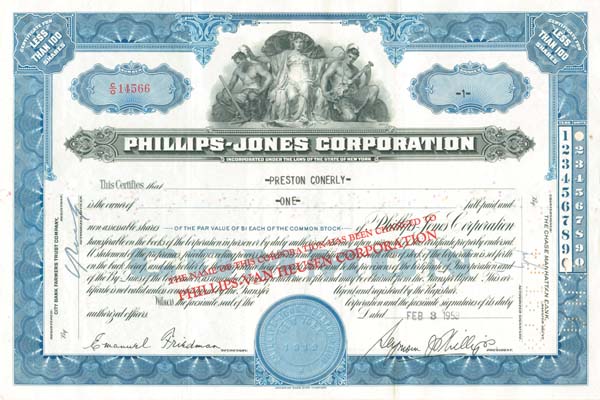Phillips-Jones Corporation - Stock Certificate
Inv# GS3072 Stock
State(s):
New York
Years:
1948-58
Color:
Blue or Olive
Phillips-Van Heusen Corporation (PVH) is a leading marketer of dress shirts, sportswear, sweaters, underwear and outerwear, and other casual clothing and accessories under the Van Heusen, Gant, Izod, and Geoffrey Beene names and footwear and related products under the Bass name. The company also markets its own private-label dress shirts and those of a few outside brands. PVH manufactures some lines of dress shirts and footwear, wholesaling its products to major retailers, chain stores, and catalog merchants, and retailing them through its own stores, generally located in factory-outlet malls.
PVH's roots may be traced to the late 19th century. In 1881 Moses Phillips, a Polish-born pushcart peddler, began selling flannel shirts sewn by his wife, Ida, to coal miners in Pottsville, Pennsylvania. His business grew, and by 1887 it was known as M. Phillips & Son. Twenty years later Phillips merged his business with D. Jones & Sons, an operator of a chain of factories in Lebanon County, Pennsylvania.
The merged company was incorporated in New York in 1914 as Phillips-Jones Co., Inc. and was renamed Phillips-Jones Corp. in 1919. The following year the company revolutionized its industry by turning out the first collar-attached dress shirt. Phillips-Jones also began manufacturing men's underwear. With Moses Phillips's son Isaac as company president during this time, Phillips-Jones marketed its garments to retailers, including the Chain Shirt Shops, in which it held an interest. The company's main plants at this time were in New York City, and Albany, New York, as well as in five Pennsylvania municipalities, including Pottsville, which would by the 1940s become its main facility. Corporate headquarters were located in New York City.
Phillips-Jones's sales came to $7.2 million in 1919 and net income was reported at $1.1 million. Profits, on $11.1 million of sales in 1922, reached $1.4 million--a peak not surpassed until 1947. Although Chain Shirt Shops was dissolved in 1926, the company's retail client base continued to increase, and by the end of the decade Phillips-Jones was producing 335,000 dozen shirts a year and quantities of pajamas, underwear, nightshirts, collars, silk cloth, and piece goods.
Sales took a dip of almost $2 million in 1930, the first full year of the Great Depression. Phillips-Jones lost money in this year, as well as in the next two years, and discontinued paying dividends, a practice not resumed until 1947. Operations then became profitable again, with the exception of the recession year of 1938, when the company's sales dropped by about one-third and led to a loss of $l.7 million.
Isaac Phillips's son Seymour became president of Phillips-Jones in 1939. He revamped the styling of shirts to improve their quality and durability, expanded the company's research and development facilities, and halved its 2,000 retail accounts to a profitable 1,000 while increasing the advertising budget from less than $10,000 a year. By 1940 the company had closed its Albany plant and opened one in Geneva, Alabama.
During the 1940s Phillips-Jones added neckwear to its product line and opened two more Alabama plants. Sales and profits increased rapidly after World War II. In 1949 the company introduced its Century collar-attached shirt; with heavy promotion, some 12.5 million of these shirts were sold in the next five years.
By 1950 the company had combined annual production of 550,000 dozen dress shirts, 250,000 dozen sports shirts, 200,000 dozen neckties, 450,000 collars, and 40,000 dozen pajamas. Phillips-Jones was operating 12 plants in 1954 and serving some 6,000 department stores and haberdashers. It also had added swimwear to its 2,000 different styles of garments.
Phillips-Jones changed its name to Phillips-Van Heusen in 1957 in honor of one of its well-known shirt brands. The company also reentered the retail business by purchasing Kennedy's, Inc., a chain of 15 New England menswear stores, in 1958. The company introduced Lady Van Heusen shirts and blouses in 1962, when shirts accounted for 80 percent of its sales (excluding Kennedy's). In 1964 the company acquired 11 Florida outlets, which continued operations under the Kennedy name.
Available in Blue or Olive. Please specify color. Stock printed by American Bank Note Company.
Available in Blue or Olive. Please specify color. Stock printed by American Bank Note Company.
Condition:
Excellent
A stock certificate is issued by businesses, usually companies. A stock is part of the permanent finance of a business. Normally, they are never repaid, and the investor can recover his/her money only by selling to another investor. Most stocks, or also called shares, earn dividends, at the business's discretion, depending on how well it has traded. A stockholder or shareholder is a part-owner of the business that issued the stock certificates.
Item ordered may not be exact piece shown. All original and authentic.










Ebay ID: labarre_galleries